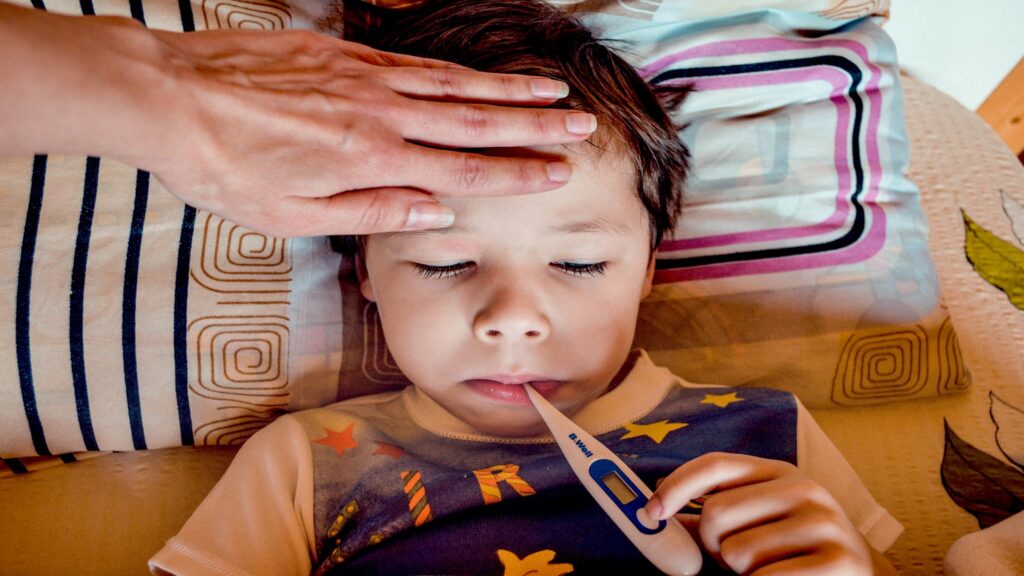
New research out of Wake Forest University Baptist Medical Center suggests that Vicks® VapoRub®, the popular menthol compound used to relieve symptoms of cough and congestion, may instead create respiratory distress in infants and small children. Vicks VapoRub may stimulate mucus production and airway inflammation, which can have severe effects on breathing in an infant or toddler.
The study appears in this month’s issue of Chest, the peer-reviewed journal of the American College of Chest Physicians, and reports that the product may stimulate mucus production and airway inflammation, which can have severe effects on breathing infants or young children because of the small size of their airways.
“The ingredients in Vicks can be irritants, causing the body to produce more mucus to protect the airway,” said Bruce K. Rubin, M.D., lead author of the study and a professor in the department of pediatrics at Brenner Children’s Hospital, part of Wake Forest Baptist. “Infants and young children have airways that are much narrower than those of adults, so any increase in mucus or inflammation can narrow them more severely.”
Vicks® VapoRub® was first compounded in 1891, in Greensboro. It was introduced in 1905 with the name Vick’s Magic Croup Salve. The flu epidemic of 1918 increased sales from $900,000 to $2.9 million in just one year and Procter & Gamble has since marketed the product as “The only thing more powerful than a mother’s touch.”
The salve is widely used to relieve symptoms of colds and congestion, but there are few data supporting an actual clinical benefit, according to Rubin. Vicks has been reported to cause inflammation in the eyes, mental status changes, lung inflammation, liver damage, constriction of airways and allergic reactions.
Interest in conducting the study developed after Rubin and colleagues treated an infant who was taken to the emergency room after developing severe respiratory distress following the application of Vicks directly under her nose. Researchers sought to determine the effect of the product on the respiratory system using ferrets, which have an airway anatomy and cellular composition similar to humans. The team conducted tests on healthy ferrets and ferrets that had tracheal inflammation (simulating a person with a chest infection) that measured the effects of Vicks on mucus secretion and buildup in the airways, and fluid buildup in the lungs.
Results showed that Vicks exposure increased mucus secretion in both normal and inflamed airways. In addition, the studies showed that exposure to the product decreased the rate by which mucus was cleared from the trachea.
The findings support current product labeling, which indicates the product should not be used on children under 2 years of age. However, many parents continue to use Vicks on their sick children, often rubbing the salve on the feet or chest, Rubin said.
“I recommend never putting Vicks in, or under, the nose of anybody—adult or child,” Rubin said. “I also would follow the directions and never use it at all on children under age 2.”
Even when directions are followed, Vicks will make people with congestion more comfortable, but it does nothing to increase airflow or actually relieve congestion, Rubin added.
“Some of the ingredients in Vicks, notably the menthol, trick the brain into thinking that it is easier to breathe by triggering a cold sensation, which is processed as indicating more airflow,” he said. “Vicks may make you feel better but it can’t help you breathe better.”
In addition to Vicks® VapoRub®, decongestants are not recommended for young children.
“Mucus is one of the most effective ways that our body protects our air passages like the nose and bronchial tubes,” Rubin said. “However, lots of mucus and inflammation can cause congestion, especially in little noses. Cough and cold medicines and decongestants are dangerous and neither effective nor safe for young children. Medications to dry up nasal passages also have problems,” Rubin said. “The best treatments for congestion are a bit of saline (salt water) and gentle rubber bulb suction, warm drinks or chicken soup, and, often, just letting the passage of time heal the child.”
Dr. Rubin also notes that if a child is struggling to breathe, it is a medical emergency and would require the child to be seen by a doctor as quickly as possible.
Co-researchers for the study were Juan Carlos Abanses, M.D., and Shinbu Arima, M.D., both of Wake Forest University Baptist Medical Center.
 Unlocking the Potential of Black Seed Oil: A Natural Ally for Metabolic and Nerve Health in Diabetes Management
Unlocking the Potential of Black Seed Oil: A Natural Ally for Metabolic and Nerve Health in Diabetes Management Zinc Lozenges: Can They Really Shorten Your Cold by 3 Days? An Evidence-Based Look
Zinc Lozenges: Can They Really Shorten Your Cold by 3 Days? An Evidence-Based Look Most U.S. children use potentially toxic makeup products, often during play
Most U.S. children use potentially toxic makeup products, often during play Are highly processed foods bad for children?
Are highly processed foods bad for children?